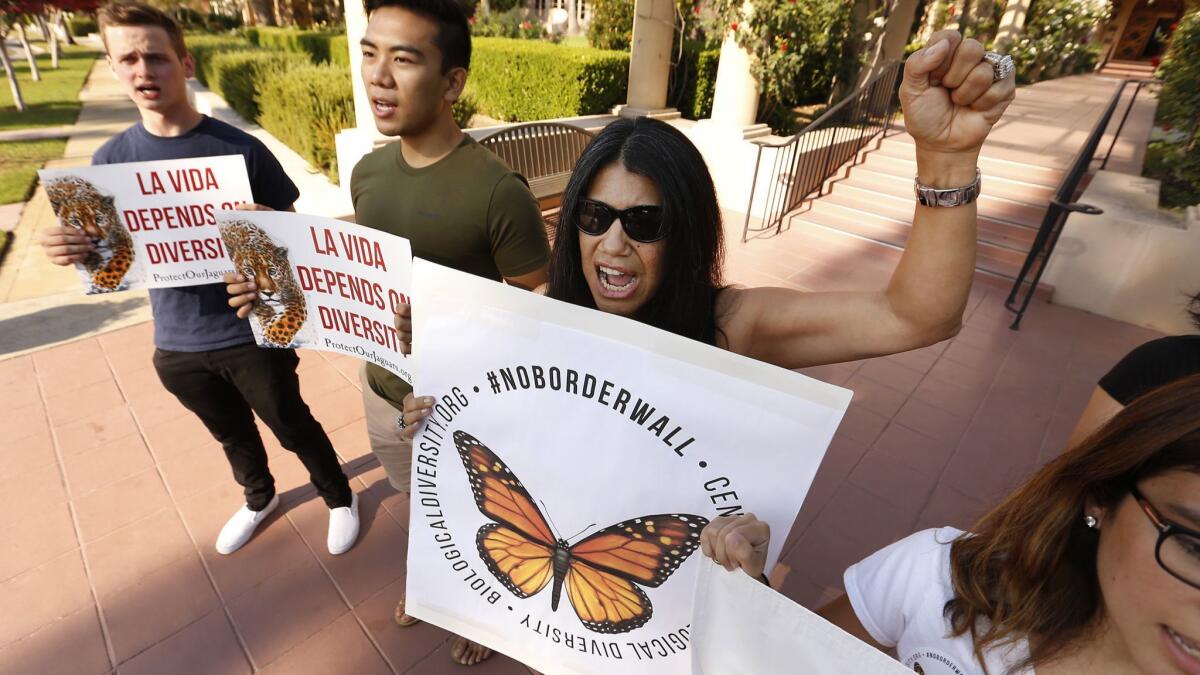U.S. appeals court wrestles with lawsuit to block border projects in California

A federal appeals court appeared uncertain Tuesday whether it had authority to weigh in on a dispute about the Trump administration’s plans to replace border fencing in California.
California and several environmental groups challenged the projects, arguing that the administration lacks authority to build them and illegally waived environmental requirements and other laws in a rush to establish new barriers on the border.
The administration counters that it has wide discretion under a 2005 federal law that gave the Department of Homeland Security the ability to waive enforcement of environmental rules and other laws that can stymie border construction projects.
During a hearing in Pasadena, a three-judge panel of the U.S. 9th Circuit Court of Appeals questioned lawyers about the precise wording of the federal law and how to interpret it.
Judge Consuelo Callahan, appointed by George W. Bush, asked why the “plain language” of the federal law didn’t support the government’s case.
“On some level the borders are a security issue,” she said. “People debate as to how much a security issue.”
Most of the arguments Tuesday were technical, parsing the wording of the federal law and addressing whether it barred circuit courts from even considering such appeals.
The law, intended to accelerate construction of border barriers, said district courts could consider only constitutional challenges of projects and that appeals had to go straight to the U.S. Supreme Court, bypassing circuit courts.
Judges M. Margaret McKeown, a Clinton appointee, and Jacqueline Nguyen, an Obama appointee, also appeared at times to challenge California’s interpretation of the federal law.
H. Thomas Byron III, representing the Department of Justice, said the law was intended to speed up border projects by barring protracted legal challenges.
“Congress specifically imposed a very clear and very specific prohibition against these kinds of claims the plaintiffs are bringing,” Byron told the court.
California Deputy Atty. Gen. Noah Golden-Krasner argued that Congress permitted waivers only for certain border projects that were built years ago.
California is appealing a decision by U.S. District Judge Gonzalo Curiel, who ruled in favor of the Trump administration in February.
Curiel is the judge whose fairness Trump questioned when he referred to him as “a Mexican” during litigation over fraud at the now-defunct Trump University. The judge, who presided over a class-action case against the real estate school, was born in Indiana.
The legal challenge is over two projects that have already begun. One involves replacing barriers along a 14-mile stretch in San Diego and the other on a two-mile stretch of Calexico.
Brian Segee, senior attorney for the Center for Biological Diversity, one of the groups fighting the projects, said after the hearing that Curiel’s rejections of the challengers’ constitutional arguments will be appealed to the U.S. Supreme Court.
He said the barriers would restrict the movement of endangered species and other wildlife, from jaguars to butterflies.
“Trump’s senseless border wall fixation needs to be stopped in its tracks,” Segee said.
The 9th Circuit could rule at any time.
Twitter: @mauradolan
More to Read
Sign up for Essential California
The most important California stories and recommendations in your inbox every morning.
You may occasionally receive promotional content from the Los Angeles Times.









